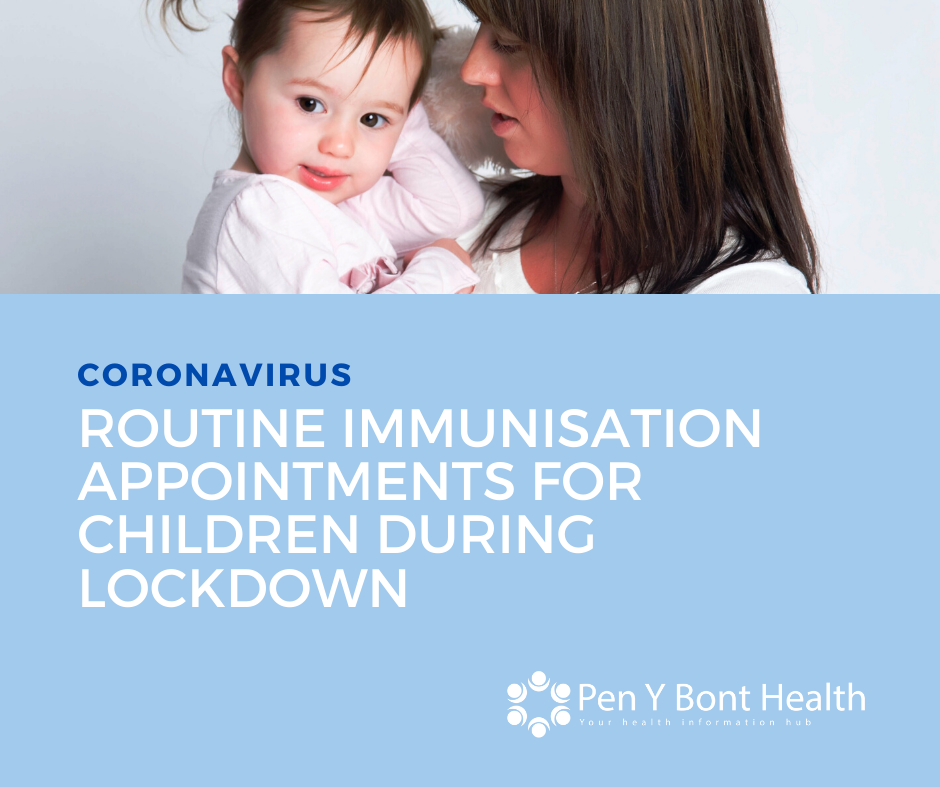Home » Childhood Immunisations
 IMPORTANT UPDATE – CORONAVIRUS
IMPORTANT UPDATE – CORONAVIRUS
Public Health Wales is reminding parents of the importance of young children continuing to attend for their routine immunisations when invited. This is vital in preventing outbreaks of serious childhood diseases including whooping cough and measles.
“Social distancing measures are in place to protect you and the nursing staff that administer the vaccines and appropriate infection control procedures are being followed. Your local health visitor will be able to offer advice and support for parents, and pregnant women can obtain advice on immunisation from their midwife.”
Dr Richard Roberts, Head of the Vaccine Preventable Diseases Programme at Public Health Wales
Childhood Immunisations
Vaccines are a safe and important way to protect your child from infectious diseases. By vaccinating your child you are not only protecting them and yourself from potentially deadly diseases but are also helping to protect other people in your community who cannot have vaccines.
In the UK, diseases like smallpox, polio and tetanus are now virtually non-existent thanks to vaccinations. Before vaccinations these diseases would kill or disable millions of people. Measles and diphtheria have also been reduced by up to 99.9% since their vaccines were introduced. [source]
In This Section
Below we have compiled a list of the NHS recommended vaccines your child should have and why.
babies
At 8 weeks your baby should have the following vaccines:
- 6-in-1 vaccine – This protects against diphtheria, hepatitis B, Hib (Haemophilus influenza type b), polio, tetanus, whooping cough (pertussis)
- Rotavirus vaccine – This protects against a highly infectious stomach bug
- MenB – This protects your baby against infections by meningococcal group B bacteria which can be very serious. Meningococcal infections can cause meningitis and sepsis, which can lead to severe brain damage, amputations and in some cases, death.
At 12 weeks your baby should have:
- 6-in-1 vaccine (2nd dose) – The 2nd dose increases the protection against diphtheria, hepatitis B, Hib (Haemophilus influenza type b), polio, tetanus, whooping cough (pertussis)
- Pneumococcal (PCV) vaccine – The pneumococcal vaccine protects against serious and potentially fatal pneumococcal infections. It’s also known as the pneumonia vaccine.
- Rotavirus vaccine (2nd dose) – The 2nd dose increases the protection against a highly infectious stomach bug.
At 16 weeks your baby should have:
- 6-in-1 vaccine (3rd dose) – The 3rd dose increases the protection against diphtheria, hepatitis B, Hib (Haemophilus influenza type b), polio, tetanus, whooping cough (pertussis).
- MenB (2nd dose) – The 2nd dose increases the protection against infections by meningococcal group B
Observation over 6 weeks will need to be made by a parent or family member and if there is improvement in symptoms, a diagnosis of asthma will be made. If there is an improvement with the initiated treatment, this will be continued.
Children aged 1 year to 15 years
At 1 year old your child should have the following vaccines:
- Hib/MenC (1st dose) – This vaccine boosts protection against Haemophilus influenza type b (Hib) and meningitis C. Both these infections are serious and potentially fatal
- MMR (1st dose) – This combined vaccine protects against 3 separate illnesses – measles, mumps and rubella (German measles). All 3 illnesses are highly infectious conditions that can have serious, potentially fatal complications.
- Pneumococcal (PCV) vaccine (2nd dose) – This increases the protection against serious and potentially fatal pneumococcal infections. It’s also known as the pneumonia vaccine.
- MenB (3rd dose) – The 3rd dose increases the protection against infections by meningococcal group B
Between the ages of 2 and 10 years
Between the ages of 2 and 10 years your child should receive a flu vaccine every year which is offered as a nasal spray to help protect them against flu
At 3 years and 4 months your child will need:
- MMR (2nd dose) – The 2nd dose of this combined vaccine increases the protection against 3 separate illnesses – measles, mumps and rubella (German measles).
- 4-in-1 pre-school booster – This pre-school vaccine tops up the protection against diphtheria, tetanus, whooping cough and polio and is a follow up vaccine from the 6-in-1 vaccine your child would have had as a baby.
Age 12 to 13 years
- HPV vaccine – The HPV vaccine (human papillomavirus vaccine) helps protect against cancers caused by HPV such as cervical cancer, some mouth and throat (head and neck) cancers, some cancers of the anal and genital areas. It also helps protect against genital warts.
Age 14 years
- 3-in-1 teenager booster – the 3-in-1 or the Td/IPV vaccine, is given to boost protection against 3 separate diseases: tetanus, diphtheria and polio.
- MenACWY – The MenACWY vaccine protects against 4 strains of the meningococcal bacteria that cause meningitis and blood poisoning (septicaemia): A, C, W and Y. Although offered in school if students miss out on the vaccine it is recommended that they contact their GP to receive the vaccine before starting college or University.
Video Support
Things to Remember
- Immunizations can save your child’s life
- Vaccination is very safe and effective
- Immunization protects others you care about.
- Immunization protects future generations
